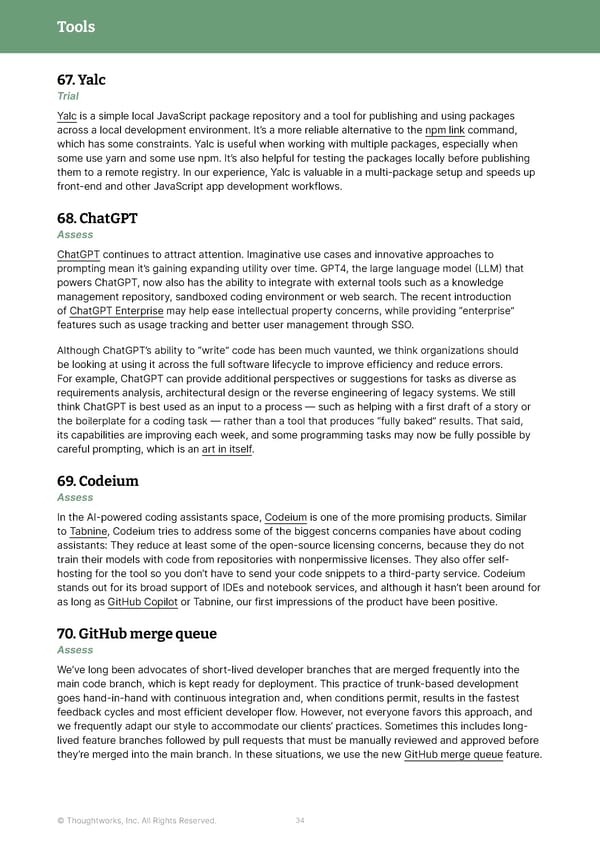Tools 67. Yalc Trial Yalc is a simple local JavaScript package repository and a tool for publishing and using packages across a local development environment. It’s a more reliable alternative to the npm link command, which has some constraints. Yalc is useful when working with multiple packages, especially when some use yarn and some use npm. It’s also helpful for testing the packages locally before publishing them to a remote registry. In our experience, Yalc is valuable in a multi-package setup and speeds up front-end and other JavaScript app development workflows. 68. ChatGPT Assess ChatGPT continues to attract attention. Imaginative use cases and innovative approaches to prompting mean it’s gaining expanding utility over time. GPT4, the large language model (LLM) that powers ChatGPT, now also has the ability to integrate with external tools such as a knowledge management repository, sandboxed coding environment or web search. The recent introduction of ChatGPT Enterprise may help ease intellectual property concerns, while providing “enterprise” features such as usage tracking and better user management through SSO. Although ChatGPT’s ability to “write” code has been much vaunted, we think organizations should be looking at using it across the full software lifecycle to improve efficiency and reduce errors. For example, ChatGPT can provide additional perspectives or suggestions for tasks as diverse as requirements analysis, architectural design or the reverse engineering of legacy systems. We still think ChatGPT is best used as an input to a process — such as helping with a first draft of a story or the boilerplate for a coding task — rather than a tool that produces “fully baked” results. That said, its capabilities are improving each week, and some programming tasks may now be fully possible by careful prompting, which is an art in itself. 69. Codeium Assess In the AI-powered coding assistants space, Codeium is one of the more promising products. Similar to Tabnine, Codeium tries to address some of the biggest concerns companies have about coding assistants: They reduce at least some of the open-source licensing concerns, because they do not train their models with code from repositories with nonpermissive licenses. They also offer self- hosting for the tool so you don’t have to send your code snippets to a third-party service. Codeium stands out for its broad support of IDEs and notebook services, and although it hasn’t been around for as long as GitHub Copilot or Tabnine, our first impressions of the product have been positive. 70. GitHub merge queue Assess We’ve long been advocates of short-lived developer branches that are merged frequently into the main code branch, which is kept ready for deployment. This practice of trunk-based development goes hand-in-hand with continuous integration and, when conditions permit, results in the fastest feedback cycles and most efficient developer flow. However, not everyone favors this approach, and we frequently adapt our style to accommodate our clients’ practices. Sometimes this includes long- lived feature branches followed by pull requests that must be manually reviewed and approved before they’re merged into the main branch. In these situations, we use the new GitHub merge queue feature. © Thoughtworks, Inc. All Rights Reserved. 34
 Thoughtworks Technology Radar Page 33 Page 35
Thoughtworks Technology Radar Page 33 Page 35